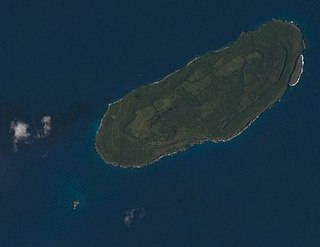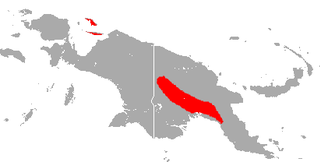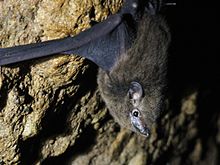
Emballonuridae is a family of microbats, many of which are referred to as sac-winged or sheath-tailed bats. They are widely distributed in tropical and subtropical regions around the world. The earliest fossil records are from the Eocene.

Aguijan is a small bean-shaped uninhabited coralline island in the Northern Mariana Islands chain in the Pacific Ocean. It is situated 8 kilometers (5.0 mi) south-west of Tinian, from which it is separated by the Tinian Channel. Aguijan and neighboring Tinian Island together form Tinian Municipality, one of the four main political divisions that comprise the Northern Marianas. The island is inhabited by wild goats and the last known habitat of a rare Pacific bat, as well as many species of birds. During WW2 a Japanese garrison was on the island, which surrendered at the end of the War without a battle. Access to the island is inhibited by the lack of a natural harbor.

Marinkelle's sword-nosed bat is a bat species found in Colombia. In 2013, Bat Conservation International listed this species as one of the 35 species of its worldwide priority list of conservation. Its species name marinkellei was chosen to honor the Dutch scientist Cornelis Johannes Marinkelle, who worked in Colombia.

The small Asian sheath-tailed bat is a species of sac-winged bat in the family Emballonuridae. It is found in Borneo, Sulawesi, and the Philippines.

Emballonura is a genus of sac-winged bats in the family Emballonuridae. It contains these species:

Beccari's sheath-tailed bat is a species of sac-winged bat in the family Emballonuridae. It is found in New Guinea and in some nearby islands in both Indonesia and Papua New Guinea.

The greater sheath-tailed bat or New Guinea sheath-tailed bat is a species of sac-winged bat in the family Emballonuridae. It is endemic to New Guinea and some nearby islands.

Seri's sheath-tailed bat is a species of sac-winged bat in the family Emballonuridae. It is found in the Bismarck Archipelago of Papua New Guinea and Yapen Island in Indonesia. Its roosts in caves.

The Fijian mastiff bat, also known as the Fijian free-tailed bat, is a species of bat in the family Molossidae. It is found in Fiji and Vanuatu. In 2013, Bat Conservation International listed this species as one of the 35 species of its worldwide priority list of conservation. This species is currently listed as endangered and considered a species of special concern due to habitat fragmentation and cave disturbance. The Fijian free-tailed bat is endemic to Fiji and Vanuatu. This species was previously documented on the islands of Taveuni and Vanua Levu, current research indicates possible small fragmented populations inhabiting both islands. Only two insectivorous bats occupy Fiji, the Pacific sheath-tailed bat and the Fijian free-tailed bat. Both species consume night flying insects, foraging high above the canopy.
Bat Conservation International (BCI) is an international nongovernmental organization working to conserve bats and their habitats through conservation, education, and research efforts.











